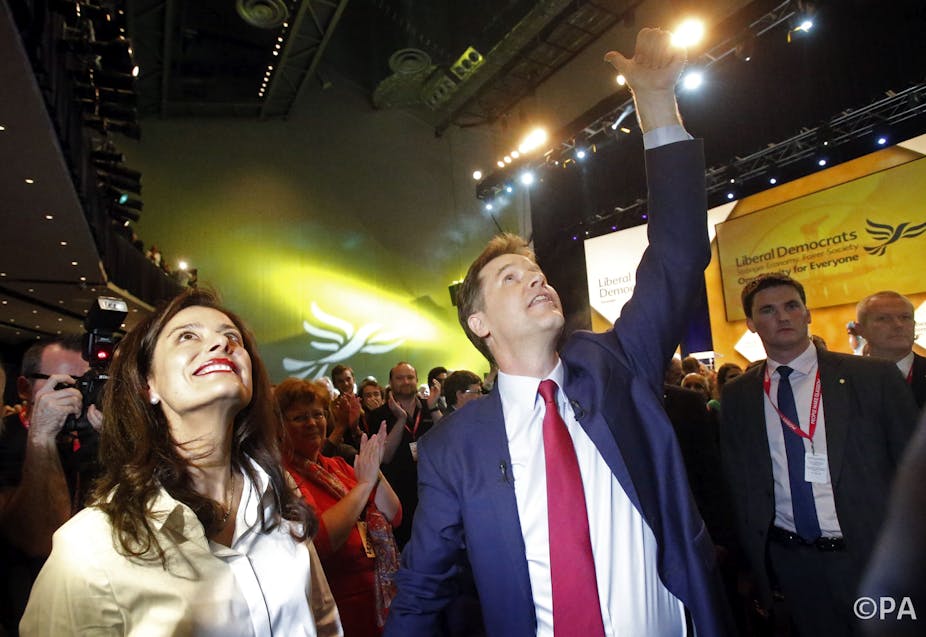Nick Clegg faced a dual challenge in his closing address to the Liberal Democrat conference in Glasgow. He had to energise his own activists in preparation for a general election seven months away and convince the wider electorate that there are good reasons for voting for his party. He appeared to succeed very well in the former – but the latter was always going to be the bigger battle.
Getting organised on the ground could help the Lib Dems defy poll ratings of as low as 6% in some constituencies, even though they have lost the benefits of incumbency in some seats as a result of retirements. The party could still win close to 30 seats – compared with its present 56 – with a single digit share of the vote, but clearly it wants to do much better than that.
But as he admitted, Clegg can no longer portray himself as the fresh-faced outsider. In the past, the Lib Dems attracted a protest “none of the above” vote but that is no longer an option. UKIP now plays the part of insurgent party in its stead. Moving from being a party of protest to a party of government has had its political costs, but Clegg claimed that without the political stability that coalition government had provided, the economy would not have recovered to the extent that it has.
He said that he thought that there would be more coalition governments in future, but was careful not to set out any red lines for future negotiations.
Voters may be prepared to concede that the Lib Dems have been a moderating influence in the coalition government, but that does not give them much of a motive for voting for them.
There have been some successes of course, and Clegg appealed to voters not to judge his party on one failed policy – which must have been a reference to tuition fees – and to look to the “countless” policies that have worked out.
Clegg’s pitch
In the speech, Clegg emphasised in particular the number of people that have been taken out of the tax system under the coalition. Unfortunately for him though, this is a reform that has been appropriated by the Conservatives. That is always a problem for a small centrist party when it comes up with a good idea. He wisely added in some new policies of his very own in the hope that the Tories wouldn’t grab everything next time round, including drastic changes to improve mental health services in the NHS. His proposals for funding the NHS more generally though, were somewhat unspecific.
Part of Clegg’s plan for his speech was to reiterate the theme of the conference: a stronger economy, a fairer society. The argument is that only the Lib Dems can offer this combination of goals. Labour has a poor economic record and cannot be trusted not to rack up yet more debt. The Conservatives have abandoned compassion, are only interested in looking after their own and could not create a fair society.
Clegg tried to bring these themes together by emphasising the idea of opportunity. He was careful to emphasise that politicians often overstated what the government could do, but he also argued that the government could create the conditions for opportunity by providing a level playing field. In many ways, this recalled the New Labour emphasis on aspiration which resonated with voters in 1997, but may be greeted more sceptically by an electorate that is mired in more difficult economic times.
He wanted to make a distinction between what he saw as a politics of blame, grievance and fear – in a clear if not explicit reference to UKIP – and what the Lib Dems offer. Clegg is pitching a politics of hope, reason and decency. But the values of tolerance and compassion which he cited as being at the heart of a liberal Britain are also adhered to by many members of other parties. By itself it is not enough.
Party activists have been remarkably upbeat during this conference, given their poor – and apparently unresponsive – poll ratings and this last act was no exception. Clegg’s speech went down well with the activists in the hall, who appeared invigorated and ready for the battle ahead, even if just for the moment. Clegg certainly produced a coherent speech and set out a clear and distinctive position on a number of issues, but whether his words will help the party’s appeal with the wider electorate very much is more questionable.

